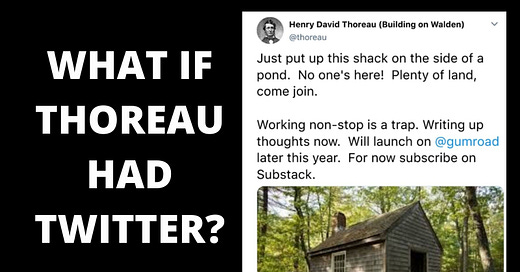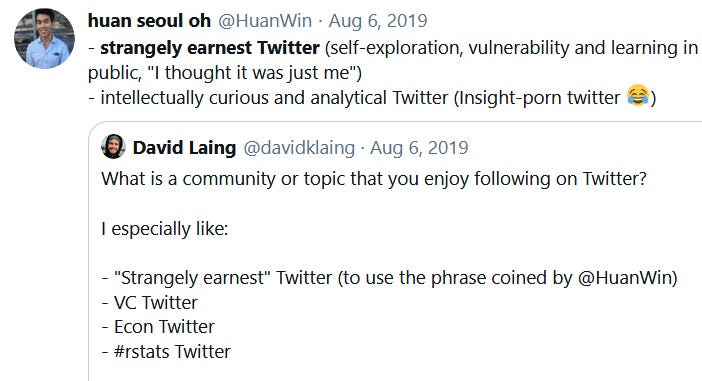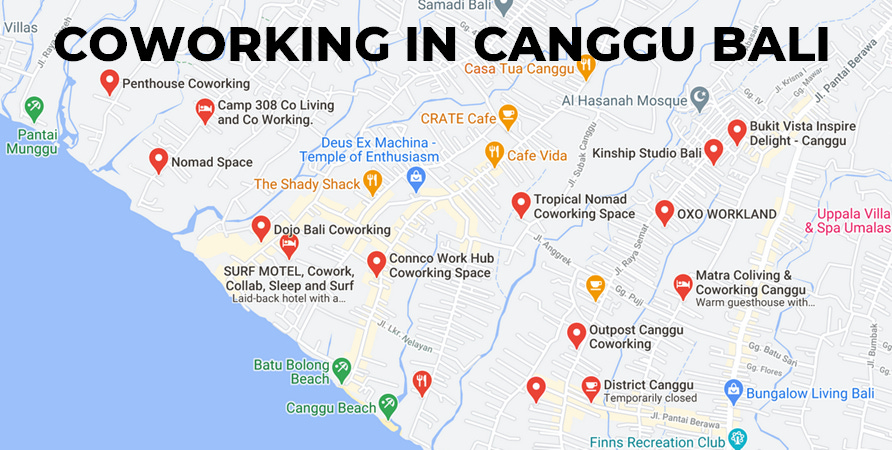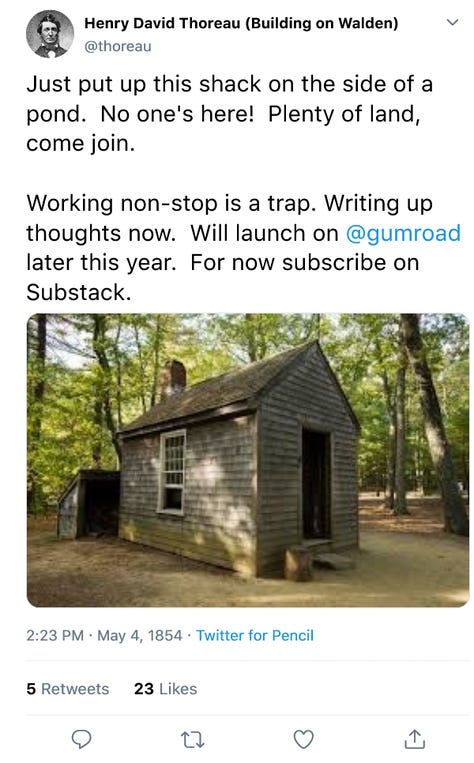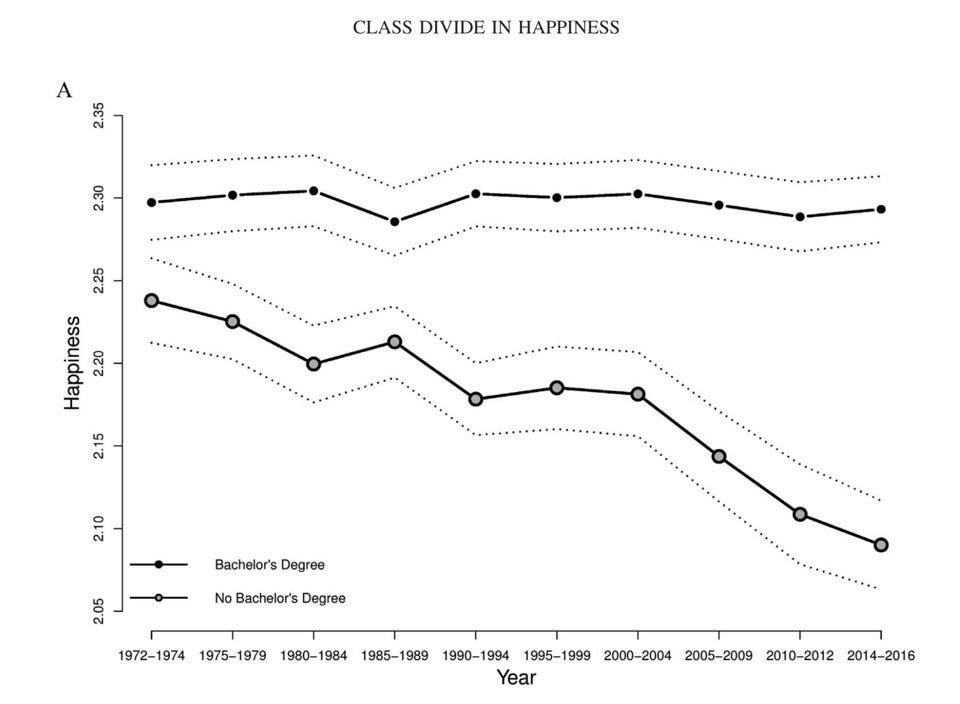#120: The Emergence Of The Digital Meta-Scene, Very Online People (VOP), Strangely Earnest Twitter, Digital Ambitions and Bold Offline Adventures
🎇 exploring the pathless path in the digital age
December 12th, 2020: Greetings! I experienced two days without internet and had my scooter stolen yesterday. This came days after I published a video on an “ode to travel” on the unexpected and surprising things that long-term travel has taught me over the last 2.5 years. You can watch the video essay here.
If you are stumbling upon this from the web, hit subscribe and join one of the best newsletters on the web written from Mexico.
👋 Happy Holidays from Angie and Paul
#1 The meta-scenius and the future
Would Thoreau have convinced more people to move to Walden pond if he had Twitter?
That was the question I was thinking about as I read American Bloomsbury, a book about a “scenius” in the mid nineteenth century in Concord, Massachusetts.
“Scenius” was the term invented by Brian Eno that I became aware of because of Packy McCormick’s essay earlier this year. Packy was trying to understand what elements led to the emergence of famous “scenes” from history such as Scotland in the 1700s, Motown, and Silicon Valley.
As I read American Bloomsbury I was struck with how many now-famous authors happened to be living within a couple of blocks of each other.. Ralph Waldo Emerson, Louisa May Alcott, Margaret Fuller, Nathaniel Hawthorne, and Henry David Thoreau and many others spent their days talking about their writing, carrying on about topics of the day and getting involved in a growing abolitionist movement.

However, most of the book highlights their shared turmoil and failure. Thoreau battled tuberculosis and died before 50. Emerson was kicked out of Harvard and the Church. Margaret Fuller died in a boat crash on Fire Island. Louis Marie Alcott had to start working to support her family because her fathers’ failed attempts to launch utopian communities.
Emerson gets the most credit for cultivating this group as the eldest in the group and also the richest (though only relatively). Most of the group was in an out of poverty and Emerson often gifted people money to help them make it through stretches of bad luck. It seems without the generosity of Emerson many of the people on this scene would not have had the space to do the work that matters to them.
Packy details four elements of a thriving scene: mutual appreciation, rapid exchange of ideas, network effects of success and local tolerance of non-traditional behavior.
While they didn’t see the kind of success that one might expect in their lives, over the long run they definitely had all four elements.
Throughout the book I kept thinking about the modern day. Are the “scenes” currently available to people up to the task of cultivating genius?
The Creator-Twitter-Friendly Nerd Meta-Scene
I have always been involved in some way in the online world. From early wrestling role-playing leagues and basketball “sims” on AOL to file sharing communities at my college to starting my own reading community on Facebook in 2008, engaging online has always been part of my life.
However, in the past five years, it has become more important. It has enabled me to find and befriend people I didn’t know I had wanted to meet.
The first time I experienced this was in Boston in 2017 through Khe He’s newsletter, Rad Reads. He had attracted thousands of people to his writing and I ended up making multiple friends from his community. One of those friends grew from a conversation over coffee in Boston to visiting him in Ho Chi Minh in Vietnam and many other great additions to my life.
When I moved to Asia in 2018, the digital became necessary. This was partly because most of the people I knew in my life were asleep during the day and partly because I only knew one person in Taiwan. Hanging out on twitter enabled me to make friends with great people in Taiwan and to start many others with people around the world via Zoom conversations, witty exchanges and private messages.
My shift in circumstances seemed to coincide with something special that was happening on twitter. The shift to 280 characters and the addition of threading seems to have disrupted some of the blogosphere and brought many of those people into the twitter orbit. When Jack Dorsey calls twitter a “public square” this is the Twitter he is talking about.
Once you experience connecting with someone that is exactly the kind of person you want to meet, especially when they are from places you’ve never even been, you become a true believer about the future of the digital to provide meaning to your life.
Twitter has emerged as a sort of meta-scene slash operating system for enabling communities to “find the others.” Let’s see how this meta-scene stacks up against Packy’s framework.
Mutual appreciation: There is a lot of mutually appreciation happening through DM conversations, podcast appearances and cross linking of essays and writing through Substacks, blogs and tweets.
Rapid exchange of tools and techniques: The generosity of people and willingness of people who have succeeded to show others how they did it has become a whole niche in itself. It’s hard to imagine the equivalent sharing of something like Nat Eliasons, “Exactly how to make passive income” in the corporate world.
Network effects of success: This is the superpower of the internet and within an online community it is quite clear that if one person succeeds it often confers a sort of halo effect around the rest of the people. In this online meta-scene there still is the sense that people are not competing with each other and that there are still unlimited niches to go around (though that sentiment could change)
Local tolerance for the novelties: While the traditional institutions have been raising alarm about online communities, it has mostly been limited to those with explicit political affiliations. The freedom of experimenting online still seems safe. For now at least.
Check, check, check and check.
For the first time, finding connection, meaning, and play online is not only possible, it is easier to do than ever. If you show up on twitter right now in good faith, people will gladly accept you into this meta-scene and show you how to engage.
I’m quite direct about my willingness to play along:
The Twitter creator / “friendly ambitious nerd” / “strangely earnest” space has become a meta-scene that is serving as an incubator for many diverse online experiments across the world and it’s not going away anytime soon.
Digital Community Ambitions Leveled Up This Year
I believe that the Coronavirus will be the catalyst for world-shaping progress by pushing the smartest people in the world to work together to tackle global scale problems. Crisis will lead to scenius. - Packy McCormick, May 2020
Within this meta-scene, there were many individual communities that took bold leaps in their ambitions and imagination of possibilities for the future this year.
By May, the many VOP (very online people) that had been hanging out for the last few years (if not longer) had realized that the pandemic wasn’t ending and sensed that if the rest of the world was going to be joining them online, it was time to level up their latent ambitions and aspirations. Some examples:
The inter-intellect shifting from an inside twitter joke and viral article to serious playground for intellectual ideas and thinking in public. This tweet from Tracy sums it up.
Communities like The Stoa and Rebel Wisdom raising the stakes on their audiences to encourage them to get involved with new types of practices for sensemaking and connection
Ness Labs has built a 1,000+ person community around the writing of Anne-Laure Le Cunff and her exploration of the creator path and what she calls mindful productivity
The Bucky Fuller Institute who has been running online Space Camps that have enabled real friendships to emerge
Venkatesh Rao built off the momentum from his Art of Gig newsletter to shift from blogger and happy shitposter to reluctant leader of the bolder Yak Collective, a loose network for “indie consultants” that collaborate on emergent projects together while experimenting with what an ideal indie collective looks like in the first place
Tiago Forte and David Perell pushing the edge on the ambitions of the online courses micro-scene by unleashing jaw-droppping course price (and then delivering insane value to match it)
Compound is building cohort-driven writing groups focused on producing great content online
Dharma Gates for virtual spiritual practice
Matt and Parul building the London Writer’s Salon online around a daily Writer’s Hour
Packy himself has built an investment syndicate around his newsletter, Not Boring
Visa, who might be one of the unofficial leaders of the VOPs, has shipped several e-books outlining the role that he thinks the “friendly ambitious nerds” can play in helping to translate between cultures and between communities.
My Climate Jouney and Airminers in the climate change space
…and whatever Jack Butcher is doing
I’ve really only been involved in one of these closely, the Yak Collective, which just had its first “annual meeting & holiday party” and celebrated the completion of four projects with several in the pipeline. It was mind blowing to see how people with diverse skillsets from all over the world are actively working on a building a new type of organization because they find it interesting.
These aren’t just slack groups and discords anymore. They are real communities with real possibilities and although it seems that there is too much happening online its clear to me that we are still at the beginning.
Can these groups make the leap from online to offline?
We will start 2021 with a transformed imagination of the possible for online connection and community. Yet people still deeply crave in person connection both in reality and in our conception of what we think we should be doing. Some people have realized that they actually prefer to spend much less time “doing things” offline and like the ease of connecting with others online.
Bridging this gap as we move to a post-pandemic reality and the decision to stay fully digital or go hybrid with an in-person strategy will be the defining business and personal decision of this decade.
I have some experience of taking part in these in-person community experiments. For the past fifteen years or so many digital nomads have been dropping into communities in Chiang Mai, Bali, Las Palmas, Puerto Escondido, Medellin, and many other places.
Bali is the most impressive one and stands out because it has a number of vital elements that guarantee its continued growth.
Cheap enough housing such that people can find their own housing at their preferred price level
Small geographic spread of people around two hubs, Canggu and Ubud
Local go-to hangouts where people can just show up and find events, friends and business opportunities (several coliving and co-working spaces)
Good enough internet such that people can engage with
A healthy interaction between local communities and expat communities that leads to good outcomes for both sides (hardest one to balance, but Bali seems better than most)
While many people have suggested they might be interested in living in intentional communities or shared housing, they often don’t understand how hard it is to transcend our wiring growing up in a reality that prides itself on personal space and private property to deal with the friction of living with others.
One bold experiment is the “Smart Village” which emerged out of the Future Thinkers podcast community. They want to build a prototype of an eventual network of “smart villages” that create thriving ecosystems in rural environments. By cultivating a community and testing many of its principles over the last few years online they are much better positioned than the intentional communities of the past.
In Concord, Thoreau was the weirdo who was trying to convince everyone that mainstream life was a trap. For the people in his scene they didn’t want to go live in nature. They liked living in houses in the center of a town. But imagine if Thoreau could have tapped into today’s meta-scene.
If you want to build a community going digital is almost the unavoidable first step. The real question is what emerges after that.
The very online people have leveled up their ambitions and skills.
We’ll have to see what comes next.
#2📖 Assorted Links
Precarity & Annie Dillard: Oshan has a fantastic newsletter this week. Subscribe if you haven’t already.
Revolt of the Public: Martin Gurri, former CIA analysts, has a fascinating interview with Antonio Garcia-Martinez:
The causes, I repeat, are structural, and not dependent on the creativity of the elites. Today, even George Washington and FDR would be roasted alive over the fires of social media. Not surprisingly, the people in charge of running things are terrified of saying anything at all – it might come back to bite them. In a Darwinian sense, they are selected for the ability to use words that have no meaning.
An Emerging Happiness Divide: I shot a video on the modern challenge of being happy. As we’ve seen a split in the labor economy, the perception of happiness is changing depending on whether you have a degree:
YouTube: I just finished Ali Abdaal’s YouTube academy. I went into it with the goal of learning more about video editing and YouTube such that I can help more people create in public. I was very happy with the results. If you want to enroll in the February cohort, feel free to signup via my link.
🙏 Thanks for reading the newsletter. This newsletter has become a ton of fun and I plan to keep doing it indefinitely. I read and reply to every e-mail so if you have thoughts, questions, comments or concern I’d love to hear them.
If you want to support my journey as an online creator you can find ways to do so here, you can become a paid support by clicking subscribe or you can hit the share button and send this to one friend who might like it.
Adios!


